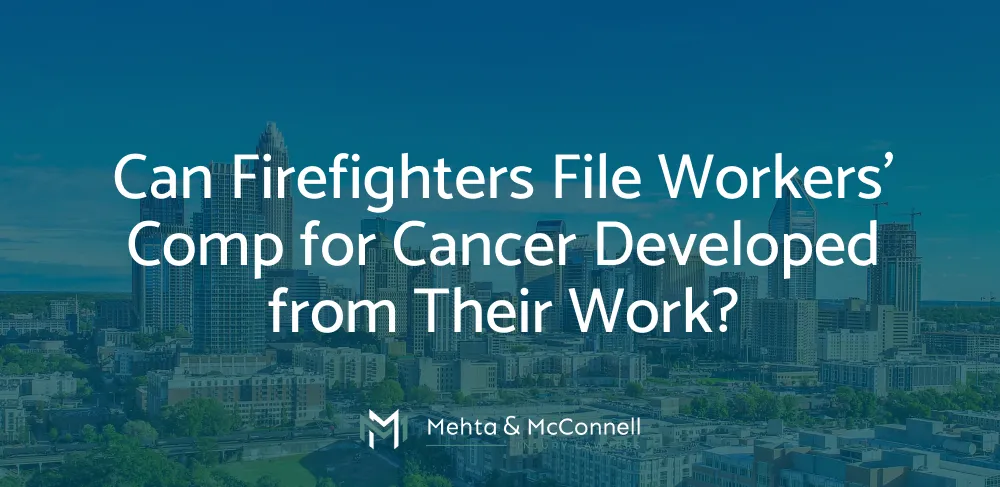 Workers' Compensation
Workers' Compensation
Firefighters in North Carolina face immediate dangers in their life-saving work and long-term health risks long after the flames are extinguished.
Unfortunately, there’s a correlation between fighting fires and cancer development. In many cases, firefighter workers’ comp will provide some benefits to those affected by occupational cancer.
However, these are complex claims, which is why you should speak with an experienced North Carolina workers’ compensation lawyer.
At Mehta & McConnell, PLLC, we are dedicated to representing first responders like you who risk their lives every day.
If you believe your cancer diagnosis is directly related to your work as a firefighter, contact our office.
Let us review your case and evaluate how we can help. In the meantime, read on to learn more about firefighter cancer risks in North Carolina.
How Can a Firefighter’s Work Cause Them to Develop Cancer?
Occupational cancer among firefighters is a growing concern arising from repeated exposure to various carcinogens present during and after fire-related events.
Substances such as asbestos, benzene, and formaldehyde, commonly encountered on the job, are scientifically linked to multiple cancer types.
Consistent inhalation, skin absorption, and possible ingestion of these hazardous materials jeopardize the immediate health of firefighters and elevate their risk as exposure increases over time.
In addition to direct exposure during firefighting, residual contaminants on gear and apparatus can further prolong exposure.
For example, some protective equipment contains PFAS (perfluoroalkyl substances) that are suspected carcinogens.
The suspected link between firefighting and heightened cancer rates underscores the necessity for a comprehensive understanding and robust navigation of workers’ compensation laws.
What Types of Cancer Are Firefighters Most At-Risk For?
Firefighters put their own lives at risk every day while protecting countless others. Lung cancer is a substantial concern due to smoke inhalation and airborne carcinogens at fire scenes.
Skin cancer, too, emerges as a significant firefighter cancer risk attributed to the skin’s direct contact with soot and toxic particles.
Furthermore, firefighters are also susceptible to mesothelioma, prostate cancer, esophageal cancer, non-Hodgkin’s lymphoma, and multiple myeloma.
The prevalence of these and other cancer types among firefighters underscores the necessity for accessible and fair firefighter workers’ comp mechanisms that address the health challenges emerging from this noble yet hazardous profession.
How to File a Workers’ Comp Claim in North Carolina
In North Carolina, filing a workers’ compensation claim for occupational cancer involves several crucial steps, subject to specific state guidelines.
Firefighters, whether at a state or federal level, should promptly initiate a claim by notifying their employer about their diagnosis.
The distinction between state and federal firefighters is pivotal, as each may navigate through different workers’ comp systems – with state firefighters typically engaging with the North Carolina Industrial Commission and federal firefighters proceeding through the Federal Employees’ Compensation Program.
Regardless of the jurisdiction, gathering and submitting all pertinent medical documentation linking the cancer diagnosis to occupational exposure is crucial.
Given the complexity and nuances of firefighter workers’ comp claims, particularly in cancer-related cases, seeking legal guidance from our experienced legal team at Mehta & McConnell, PLLC, is a crucial first step.
We can help streamline the process, provide strategic advice, and help ensure your claim progresses through the proper channels.
Federal Firefighters and Workers’ Comp Claims for Occupational Cancer
Recent policy changes have ushered in a more compassionate approach to workers’ compensation claims for federal firefighters battling occupational cancer, alleviating previous challenges embedded in the process.
Before April 2022, firefighters were obligated to substantiate a direct causal relationship between their work and chronic illnesses.
The Labor Department now classifies numerous cancers and chronic conditions as “high risk” for federal firefighters, essentially waiving these additional evidence requirements to validate the link between a professional event and disease.
To be designated a “high-risk” claim, there must be a diagnosis of specified cancers or conditions, coupled with a firefighting career span of at least five years and diagnosis within a decade of last exposure.
Benefits Provided Under Workers’ Compensation for Firefighters
Understanding the benefits provided under workers’ compensation is vital for firefighters navigating the complexities of firefighter workers’ comp claims.
When occupational cancer or other work-related health conditions arise, you might be entitled to receive:
- Medical benefits. These benefits help with reasonable and necessary medical treatment, including hospital stays, surgeries, prescriptions, and relevant therapies, assisting firefighters to receive comprehensive treatment without the impending financial strain.
- Wage replacement. Firefighters experiencing work absences due to occupational cancer might receive wage replacement benefits, typically a percentage of regular wages. Wage replacement can provide some financial stability during periods of recovery.
- Disability benefits. Depending on the severity and duration of the disability (temporary or permanent, partial or total), firefighters may be eligible for disability benefits, providing financial assistance that correlates with their impairment level and earning capacity.
- Vocational rehabilitation. For firefighters unable to return to their previous roles due to a cancer diagnosis, vocational rehabilitation benefits assist in training for new, suitable employment.
If the unthinkable happens and a firefighter succumbs to cancer, death benefits can provide some financial support to surviving dependents.
The experienced legal team at Mehta & McConnell, PLLC, can explain these benefits in greater detail and how each of these might apply to your claim.
Contact a North Carolina Workers’ Compensation Lawyer
At Mehta & McConnell, PLLC, we understand the complex nature of firefighter workers’ comp claims. We primarily represent injured workers seeking compensation for their injuries.
While our firm was established in 2021, our lawyers have over three decades of combined legal experience.
While we started our careers representing insurance companies and large corporations, we now exclusively represent injured victims.
Our prior defense experience gives us a unique advantage in workers’ compensation cases. Contact our office today to schedule a consultation and learn more.

